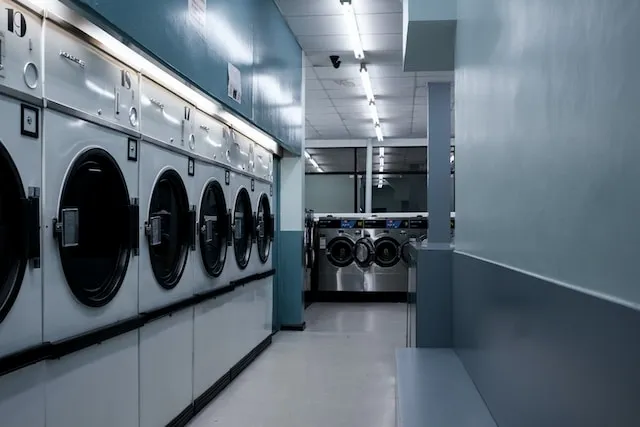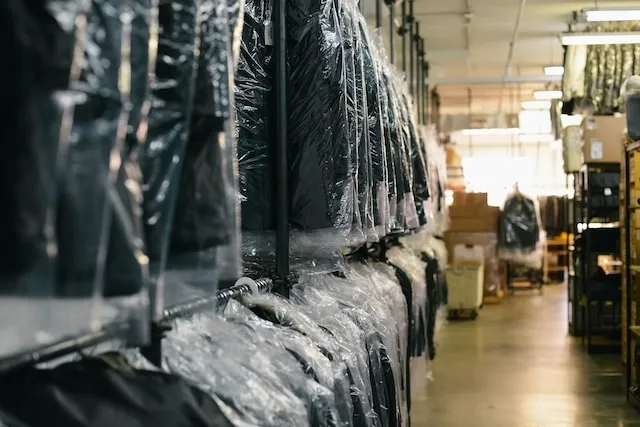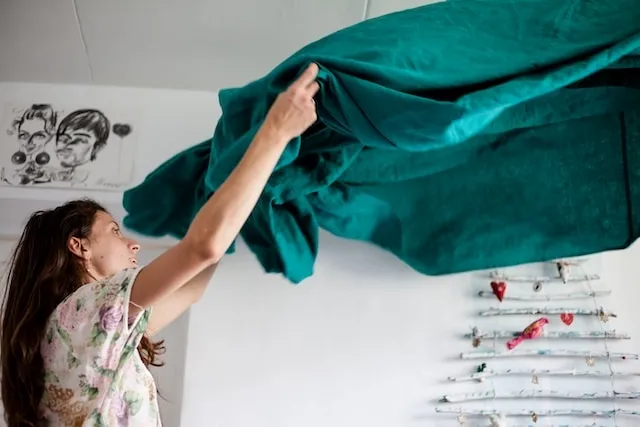Guide To Dry Cleaning Tablecloths
Learn the ins and outs of dry cleaning tablecloths with our comprehensive guide. In this post, we unravel the intricacies of preserving your all-important table linens, exploring the nuances involved in dry cleaning tablecloths of different fabrics. Whether it's delicate lace or durable polyester, you'll find expert tips to remove stains while preserving the pristine appearance of your table covers. Brush up on your understanding of tablecloth maintenance by joining us on this exploration of the art of dry cleaning table linens.

Key Takeaways
- You will need a reputable dry cleaner to get good results for your tablecloths.
- Dry cleaning uses solvents to clean fabrics, while washing uses water and detergent.
- Dry cleaning is gentle on fabrics, and can tackle tough stains. But it is expensive and not environmentally-friendly.
- Delicate fabrics like silk and linen are usually a good fit for dry cleaning.
- It is not usually necessary to dry clean polyester tablecloths, but you can.
- Our high-quality custom tablecloths are suitable for machine washing.
Table of contents
-
How To Dry Clean Tablecloths
-
Dry Cleaning Vs. Washing Table Covers
-
Can You Dry Clean Polyester Tablecloths?
-
How To Make Sure You Don't Damage Your Tablecloth When Dry Cleaning
-
Advantages Of Dry Cleaning Your Tablecover
-
Disadvantages Of Dry Cleaning Your Tablecover
-
Things To Keep In Mind When Dry Cleaning Custom Tablecloths
How To Dry Clean Tablecloths
Dry cleaning tablecloths is all about removing stains whilst preserving the fabric. It can be an important part of washing table covers, but it is crucial to do it correctly. Here’s how to do it.
- Check the fabric: Look closely at the tablecloth’s care label and ensure it’s suitable for dry cleaning. Delicate fabrics like lace or silk often have to be cleaned professionally.
- Pre-treat stains: If there are stains present, address them before cleaning. Blot them with a clean cloth and apply a suitable stain remover, following the product instructions carefully.
- Choose a trustworthy cleaner: A reputable dry cleaner with experience in handling table linens is essential. Look for companies that specialize in delicate fabrics and use eco-friendly solvents.
- Point out the stains: Make sure the dry cleaner is aware of the stains you want cleaned. Provide details of the origin of the stains if possible.
- Packaging: Put the tablecloth in a breathable garment bag to take it to the cleaner. Avoid plastic as it traps moisture easily.
- Inspect at collection: When you retrieve the tablecloth upon completion of the cleaning, inspect it thoroughly to ensure it is clean and the fabric is not damaged.
Follow these steps to take your table cover to the tablecloth cleaners and you should get good results from dry cleaning your table linens.

Dry Cleaning Vs. Washing Table Covers
Is it better to wash or dry clean tablecloths? Well, the main variable in this decision is the fabric and its specific care instructions. Here is a breakdown of the two methods:
- Dry cleaning tablecloths: This involves the use of solvents to clean fabrics without having to use water. It is a great fit for delicate or intricate materials, like silk, lace, or embellished fabrics. The goal is to preserve the fabric’s integrity and prevent damage that can occur during a traditional machine wash.
- Washing tablecloths: This is a more common and accessible method. Machine-washable fabrics, like cotton and polyester, should be washed in a gentle cycle using a mild detergent. This is usually sufficient to clean them and prevent damage, but you should always pay attention to the care label and manufacturer recommendations.
The deciding factor between washing and dry cleaning tablecloths is usually the material, and the level of care it requires. Our custom printed tablecloths are machine washable and easy to care for.
Pros And Cons Of Dry Cleaning Tablecloths
There are advantages and disadvantages to dry cleaning tablecloths. In short, dry cleaning is good for preserving delicate fabrics, but it is a slower and often more expensive process than washing, and it frequently involves solvents that are harmful for the environment.
Let’s explore the pros first:
- When you dry clean tablecloths, it is gentler on fabrics that are prone to damage from water cleaning. It helps retain colors, textures and embellishments on delicate table covers.
- The process is often very effective at removing tough stains that might be harder to address with conventional washing.
Now let’s take a closer look at the cons:
- Dry cleaning is a professional service that usually costs more money than machine washing. It is also slower, making it less convenient.
- Dry cleaning tablecloths involves the use of harsh solvents, which isn’t compatible with certain fabrics. And these chemicals are often harmful for the environment.
It can make things easier to work with tablecloths that are easily machine washable, like our custom print-on-demand tablecloths.
Materials Requiring Dry Cleaning
It’s important to be mindful of which table cover materials are more likely to need dry cleaning. Tablecloths made from materials like polyester or cotton will probably fare well in a washing machine, but the following materials are more delicate and may need to be dry cleaned:
- Silk: Regular washing can ruin the sheen and texture of this fabric.
- Lace: Water washing can damage the intricate patterns of a lace tablecloth.
- Wool: Water can cause wool to shrink or list its shape, so dry cleaning is often recommended.
- Velvet: With its superb softness and pile structure, dry cleaning is a good way to protect velvet from damage to its stitched designs.
- Embroidered fabric: If there is intricate embroidery in your tablecloth, dry cleaning may be the best solution to avoid damage to the stitching.
It’s important to check the care label on your tablecloth to determine how it should be cleaned. This is an important factor in determining the best fabric for a table cover, so you should consider the issue of dry cleaning tablecloths early on.
Polyester Tablecloths
Is it better to wash or dry clean polyester? Well, polyester tablecloths are generally low-maintenance and easy to care for. Dry cleaning is not usually necessary, as the fabric is durable, stain-resistant, and machine washable.
The recommended care steps are as follows:
- Wash in a washing machine, using a gentle cycle in line with the care instructions.
- Use a mild detergent to avoid damaging the fabric.
- Don’t use fabric softener as it may leave a residue on the fabric’s surface.
- Dry at a low temperature or, better yet, air dry to prevent wrinkles and preserve the fabric.
- Polyester fabric can be ironed at low temperatures to remove wrinkles.
We provide detailed instructions on how to wash polyester tablecloths, because most of our custom tablecloths are made from this fabric. It is easy to maintain and durable, and you still get a high-quality aesthetic from it.
Looking for stain-resistant table covers?
Our custom waterproof tablecloths don’t absorb liquids so they are resistant to most stains, meaning you never need to worry about dry cleaning or difficult washing practices.
Can You Dry Clean Polyester Tablecloths?
We are sometimes asked, "Why does 100% polyester need to be dry cleaned?" The answer is that it doesn't, but it can be. Keep in mind that polyester tablecloths can usually be easily maintained through machine washing, but there are exceptions to this. If you notice that your polyester tablecloth says "dry clean only," it may be due to specific embellishments or intricate details in the design.
Before deciding on a cleaning method, check the care instructions provided by the manufacturer. Our custom table linens are made from polyester and are always machine washable. However, guidelines are included for a reason, so it's best to follow them. For most polyester table covers, machine washing is safe and effective, saving you time and money over using a professional dry cleaner.

Should 100% Polyester Be Dry Cleaned?
In most cases, there is no need to dry clean tablecloths made from 100% polyester. This is a durable and versatile fabric that is almost always machine washable. The only exceptions to this are when there are intricate details or embellishments in the design that are more delicate, and thus may not be suitable for the rigors of machine washing.
Always pay close attention to the care label that the manufacturer provides with your table covers. Whatever your polyester item is, this will guide you as to the best approach to cleaning them. In the vast majority of cases, machine washing will be a safe and effective solution for 100% polyester, with a smaller investment of time and money to get results.
How To Make Sure You Don't Damage Your Tablecloth When Dry Cleaning
To make sure no damage occurs when dry cleaning tablecloths, pay attention to the following steps:
- Care labels: Pay close attention to the manufacturer’s care instructions. These often contain vital information about the cleaning requirements for your specific product. If there are particularly delicate details or embellishments, look for a dry cleaner that specializes in this.
- Inspect it first: Before handing your tablecloth over for dry clean, look for stains or spots first. Mark them with a fabric-friendly marker to draw the attention of the dry cleaner to problem areas. If there are any detachable elements, make sure they are removed so as not to be damaged.
- Choose a reputable dry cleaner: You need a professional with a proven record of handling delicate fabrics. Inspect your tablecloth for signs of damage after dry cleaning, and address issues promptly to maintain your cover’s pristine appearance.
It’s also important to pay attention to the right way to store table covers to help preserve their integrity.
Our tablecloths don’t need to be dry cleaned
When you order custom polyester tablecloths from us, you can rest assured you will never need to take them to the dry cleaners. They are machine washable and low-maintenance.
Order todayAdvantages Of Dry Cleaning Your Tablecover
There are several advantages to dry cleaning tablecloths, and it is a preferred option for certain materials:
- Delicate fabrics: Dry cleaning is a very effective way of ensuring delicate materials with intricate designs remain undamaged. Traditional washing puts a strain on the fabric, but the techniques used in dry cleaning are gentler.
- Stubborn stains: The solvents used to dry clean tablecloths are very effective at removing stubborn stains. You will minimize the risk of shrinkage or color fading, and the skilled technicians that carry out the process will understand the nuances of different fabrics, ensuring meticulous care.
- Convenience: Dry cleaning is a simple, convenient solution that spares you the labor-intensive task of washing and ironing table covers yourself.
For many fabrics, the choice to dry clean tablecloths means better results and less work on your part. This is a valuable service for many, and it is a necessary solution for tablecloths that say ‘dry clean only’ on the care instructions.
Disadvantages Of Dry Cleaning Your Tablecover
The drawbacks of dry cleaning tablecloths may make you think twice before doing it unless it’s absolutely necessary:
- Expensive: It usually costs more to dry clean tablecloths than it does to use traditional washing methods. The professional expertise and specialized solvents involved lead to higher costs, so it is less economical for routine cleaning.
- Odors: The solvents used for dry cleaning sometimes have distinct odors that linger after cleaning. The smell will fade over time, but this can be a short-term inconvenience.
- Harsh chemicals: The chemicals used in dry cleaning table linens are not suitable for all fabrics, and they are harmful for the environment. Additionally, they might not remove all types of stains, depending on the origin and the fabric involved.
- Relinquishing control: By relying on professional cleaners, you have less control over the cleaning process. If the service provider isn’t the best, you may not get the best results.
These are important things to keep in mind when considering whether it is better to wash or dry clean tablecloths.

Low-maintenance tablecloths with custom designs - no dry cleaning
Dry cleaning can be expensive. Our custom spandex tablecloths are not suitable for dry cleaning, but you can machine wash them for easy stain removal.
Things To Keep In Mind When Dry Cleaning Custom Tablecloths
Our custom size tablecloths are made from premium polyester for a low-maintenance, high-quality finish. The fabric is durable and easy to care for, with vibrant colors and precise designs throughout. All are machine washable, and you can get very good results from cleaning this way.
But you may choose to dry clean if you have particularly stubborn stains, or if it is your preference, and you should keep some things in mind when doing so:
- Always pay close attention to the instructions on the care label.
- Choose an experienced, reputable dry cleaner with a record of handling polyester fabric.
- Identify problem stains for the dry cleaner and provide information about what caused them.
- Once your tablecloth is cleaned, be sure to fold it and store in a cool, dry place, away from direct sunlight, to prevent damage to the fabric.
Adhere to this basic guidance to ensure the best possible results when dry cleaning tablecloths you bought from our custom service.
Frequently Asked Questions About Dry Cleaning Tablecloths
How To Dry Clean Tablecloths
Identify a reputable dry cleaner and prep the tablecloth, making sure to identify problem stains and alert the service provider about them. Also, check the tablecloths afterwards.
Dry Cleaning Vs. Washing Table Covers
Dry cleaning is gentle on delicate fabrics and can remove tough stains. But washing is simpler, cheaper, and perfectly good for many fabrics, with less environmental impact.